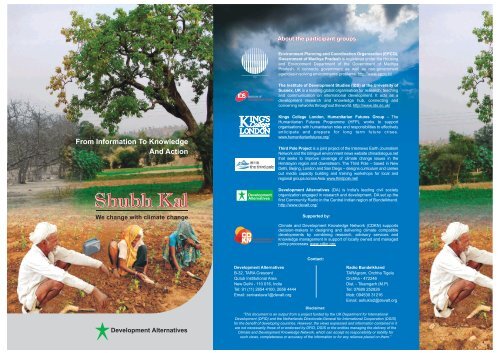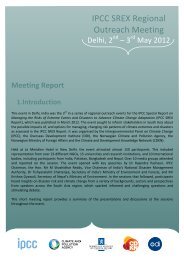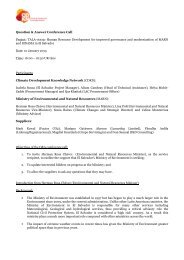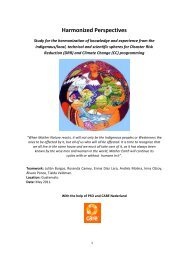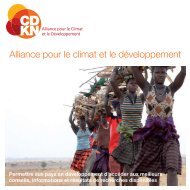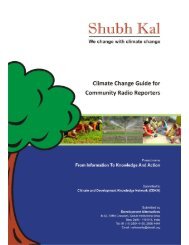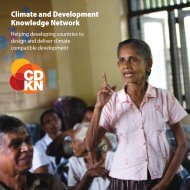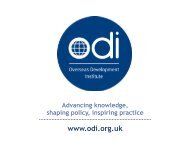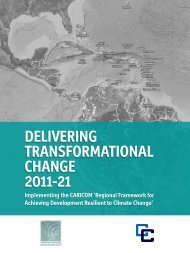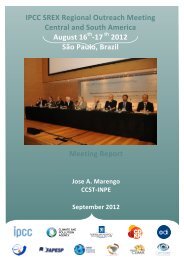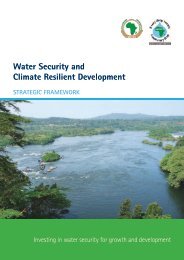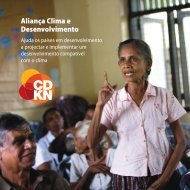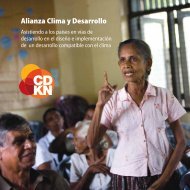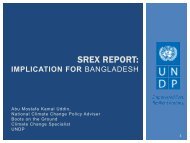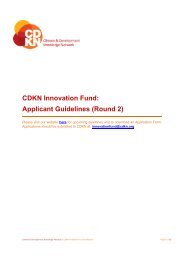CDKN Shubh Kal Brochure 27.08.12 - CDKN Global
CDKN Shubh Kal Brochure 27.08.12 - CDKN Global
CDKN Shubh Kal Brochure 27.08.12 - CDKN Global
You also want an ePaper? Increase the reach of your titles
YUMPU automatically turns print PDFs into web optimized ePapers that Google loves.
Environmental Planning & Coordination Organisation<br />
(EPCO)<br />
Environment Planning and Coordination Organization (EPCO),<br />
Government of Madhya Pradesh is registered under the Housing<br />
and Environment Department of the Government of Madhya<br />
Pradesh. It connects government as well as non-government<br />
agencies in solving environmental problems. http://www.epco.in/<br />
The Institute of Development Studies (IDS) at the University of<br />
Sussex, UK is a leading global organisation for research, teaching<br />
and communication on international development. It acts as a<br />
development research and knowledge hub, connecting and<br />
convening networks throughout the world. http://www.ids.ac.uk/<br />
From Information To Knowledge<br />
And Action<br />
Kings College London, Humanitarian Futures Group - The<br />
Humanitarian Futures Programme (HFP), works to support<br />
organisations with humanitarian roles and responsibilities to effectively<br />
anticipate and prepare for long term future crises.<br />
www.humanitarianfutures.org/<br />
Third Pole Project is a joint project of the Internews Earth Journalism<br />
Network and the bilingual environment news website chinadialogue.net<br />
that seeks to improve coverage of climate change issues in the<br />
Himalayan region and downstream. The Third Pole – based in New<br />
Delhi, Beijing, London and San Diego – designs curriculum and carries<br />
out media capacity building and training workshops for local and<br />
regional groups across Asia. www.thirdpole.net/<br />
Development Alternatives (DA) is India's leading civil society<br />
organization engaged in research and development. DA set up the<br />
first Community Radio in the Central Indian region of Bundelkhand.<br />
http://www.devalt.org/<br />
Supported by:<br />
Climate and Development Knowledge Network (<strong>CDKN</strong>) supports<br />
decision-makers in designing and delivering climate compatible<br />
developments by combining research, advisory services and<br />
knowledge management in support of locally owned and managed<br />
policy processes. www.cdkn.org<br />
Contact:<br />
Development Alternatives<br />
B-32, TARA Crescent<br />
Qutub Institutional Area<br />
New Delhi - 110 016, India<br />
Tel: 91 (11) 2654 4100, 2656 4444<br />
Email: ssrivastava1@devalt.org<br />
Radio Bundelkhand<br />
TARAgram, Orchha Tigela<br />
Orchha - 472246<br />
Dist. - Tikamgarh (M.P)<br />
Tel: 07680 252826<br />
Mob: 094530 31216<br />
Email: ashukla2@devalt.org<br />
Disclaimer:<br />
“This document is an output from a project funded by the UK Department for International<br />
Development (DFID) and the Netherlands Directorate-General for International Cooperation (DGIS)<br />
for the benefit of developing countries. However, the views expressed and information contained in it<br />
are not necessarily those of or endorsed by DFID, DGIS or the entities managing the delivery of the<br />
Climate and Development Knowledge Network, which can accept no responsibility or liability for<br />
such views, completeness or accuracy of the information or for any reliance placed on them.”
We change with climate change<br />
Map of the Community Radio Network in the Project Area<br />
“Nature has enough for<br />
everyone’s need, but<br />
not for anyone’s greed.”<br />
– Mohandas K. Gandhi<br />
<strong>Shubh</strong> <strong>Kal</strong> is a campaign<br />
run by Development<br />
Alternatives to inform and<br />
e d u c a t e t h e r u r a l<br />
community of Bundelkhand<br />
regarding the risk of climate<br />
change and possible<br />
adaptation options.<br />
With over 80% of the<br />
population dependent on<br />
agriculture, climate change<br />
is posing a growing threat<br />
to the livelihood security of<br />
the rural community in<br />
Bundelkhand. Increasing<br />
droughts and reducing crop<br />
yields are pushing people<br />
into extreme poverty.<br />
<strong>Shubh</strong> <strong>Kal</strong><br />
We change with<br />
climate change<br />
Need for sharing knowledge<br />
Despite extensive research, existing knowledge on how to adapt to the changing climate<br />
is fragmented and dispersed in India. New knowledge generated from research often fails<br />
to appropriately address the concerns of rural communities. This is on account of the<br />
following factors:<br />
∑Challenges in communicating science to communities in ways that are easily<br />
understood by them<br />
∑Inability to integrate traditional knowledge of the farmers by the scientific community<br />
?Inadequate influence of voices from the ground in policy development<br />
Effects of communication gaps<br />
Research shows that simple adaptation actions could greatly reduce the impacts of<br />
climate change. However, researchers and policy-makers are often poorly linked to<br />
communities and to each other. Therefore, farmers do not always make long term<br />
sustainable decisions but go for short term and quick money solutions which may actually<br />
turnout to be non-productive.<br />
Bridging the information gap<br />
This project aims to strengthen community knowledge on climate change impacts and<br />
adaptation measures by facilitating the process of grassroot voices integrating into local<br />
scientific research and policy dialogue.<br />
Policy and<br />
decision<br />
makers<br />
Practice to Policy Connect<br />
Scientific<br />
Community<br />
C o m m un i ty r a d i o repo rters w il l bri n g ba c k<br />
the informati o n ne e d a nd qu eries in the fo r m o f<br />
feed b a c k and sha re it wi th lo c a l experts<br />
Decision makers will communicate through<br />
intermediaries - community radio<br />
The informatio n wil l reach the c o m m unity throug h<br />
communi t y radio a n d trained rep o rters<br />
Communicating radio reporters will bring back the policy intervention needs<br />
and queries in the form of feedback and share it with local experts<br />
Farming<br />
Community<br />
Effective alternative communication mediums<br />
Radio is still the effective medium of communication in rural India. It is trusted and heard<br />
by communities. In the last five years, community radio has emerged as an effective<br />
alternative medium for creating a dialogue with communities.<br />
This project will facilitate the engagement of the existing community radios of the region<br />
with climate change scientists to strengthen community voices in knowledge sharing for<br />
climate change adaptation.<br />
The main objectives of this action research project are to:<br />
∑Strengthen the understanding of emerging climate science research amongst<br />
communities and communicators<br />
∑Increase the role of intermediaries in the form of community radios in linking<br />
community voices to scientific research and climate change policy<br />
The beneficiaries<br />
New findings on the promotion of knowledge sharing for adaptation can help:<br />
∑Local broadcasters: understand, interpret and advocate for communities that are<br />
vulnerable to climate change<br />
∑Local Communities: understand how climate change increases their risk and<br />
ways to adapt<br />
∑Scientists and Researchers: understand community priorities and experiences<br />
with respect to climate change<br />
∑Local Policymakers: increase awareness on how climate change is impacting<br />
local development and the policy implication of these impacts.<br />
Facilitating knowledge sharing between stakeholders will change the way science<br />
informs policy and community and vice a versa.


